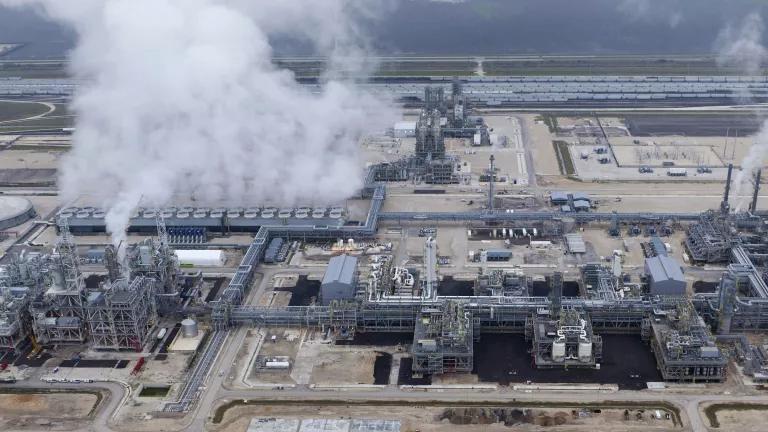How to Raise Revenue Quickly: End Fossil Fuel Handouts
The House Natural Resources Committee has released a budget proposal that would end a slew of harmful handouts to the fossil fuel industry, protect publicly owned resources, and raise significant new revenues for U.S. taxpayers. This is a fiscally responsible approach to resource development after a century of waste and mismanagement.

Oil well on public land in New Mexico
The House Natural Resources Committee has released a budget proposal that would end a slew of harmful handouts to the fossil fuel industry, protect publicly owned resources, and raise significant new revenues for U.S. taxpayers. This is a fiscally responsible approach to resource development after a century of waste and mismanagement.
For over a century, the federal government has practically given public lands away to oil and gas companies by auctioning them off for small sums. With bids beginning as low as $2/acre and rents starting at just $1.50/year, fossil fuel producers have been able to control millions of acres of public land, even without using them to produce oil and gas. Meanwhile, industry has been let off the hook when it leaks methane or allows it to be vented and flared. This happens without repercussions or costs to companies at fault, despite the value of methane as a resource and its extraordinary harm as a climate pollutant, not to mention the health impacts for those who live in the wake of these industrial operations. Complex wells that cost tens to hundreds of thousands of dollars to cap after they run dry are operated without any assurance—legal or fiscal—that the driller will cap them instead of walking away. Each of these practices, and many more, amount to billions of dollars in hidden subsidies that the oil and gas industry enjoys to produce the very fuels that are driving climate change and causing incalculable damage to the nation’s ecosystems and communities every year.
Now, the House Natural Resources Committee is staring down these irresponsible practices with a suite of fiscal reforms that will transform the federal oil and gas program and make it work to the benefit of taxpayers, instead of fossil fuel CEOs.
Here’s a look at some of the big changes the Committee is proposing:
- Higher royalty rates charged on resources produced from federal leases. The new royalty rate more closely harmonizes the federal rate with the rates charged by major oil and gas producing states, would raise billions of dollars of new revenues, and would ensure a more fair return for taxpayer-owned resources.
- Increased minimum bids and rental rates on federal leases, shorter lease terms, and an end to non-competitive leasing. These changes will discourage the rampant practice of speculative leasing and help to ensure that companies only nominate and bid on parcels that they truly intend to develop within a reasonable timeframe.
- Increased bonding rates and mechanisms for ensuring bond amounts are adequate to cover the costs of capping and remediating idled wells. This increased cost of doing business will help confront the growing problem of orphaned and abandoned wells and ensure that taxpayers are not left on the hook to clean up the industry's polluting legacy.
- Required royalties on all produced methane, including leaked and flared methane. This fee will ensure that taxpayers are compensated for all resources extracted from federal public lands, limit waste, and encourage drillers to identify and remediate the methane leaks that are currently leading to a massive spike in dangerous emissions of this climate super pollutant.
Other proposals include fees to support conservation efforts, discourage speculation, and help resource managers inspect oil and gas operations on public lands. Another key change includes closing sensitive landscapes and areas with little chance of ever being developed like the Arctic National Wildlife Refuge and offshore areas in the Atlantic, Pacific, and Eastern Gulf of Mexico to oil and gas development. This would save precious government resources and allow these areas to be managed in ways that will protect their value to the public and critical ecosystems instead of subjecting them to the harms of fossil fuel development.
This plan puts taxpayers before polluters. For over a century the oil and gas industry has been able to write the rules for how they are managed. The federal fossil fuel leasing system is broken, and the number of reforms in this single package from House Natural Resources shows just how out of hand the situation has gotten. These common sense proposals rebalance the scales. They’ll allow our land managers to make our public lands and waters work for people, the climate, and the countless species that depend on them for survival.




